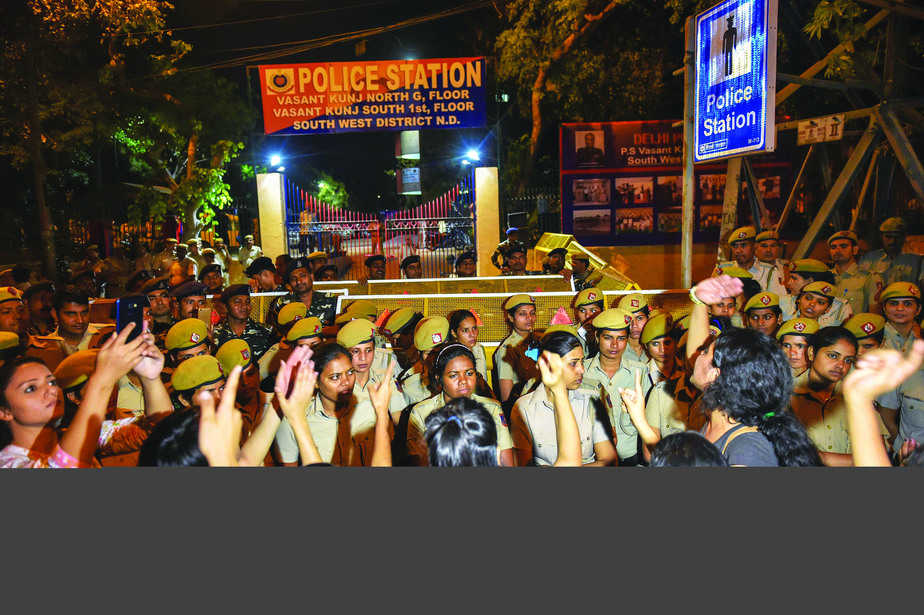
The campus of Delhi’s prestigious Jawaharlal Nehru University (JNU) has been under the spotlight yet again, with a fresh wave of protests against School of Life Sciences’ professor Atul Johri.
The professor has been accused of sexual harassment by at least eight students, and FIRs have been lodged in the matter, which has rocked the campus and social media alike. On Tuesday, the professor was finally arrested and immediately granted bail.
“I am a victim of politics,” he was quoted as saying by ANI, while his lawyer called him a “scapegoat”.
“The children used to work with the professor. He had reprimanded them for their attendance and had asked them to attend classes. The students conspired to complain against him,” lawyer RK Wadhva told ANI.
But the charges against the professor are serious as the women students from his department issued a statement accusing Johri of openly demanding sex.
Here’s a break-down of what transpired over the last one week, culminating in Johri’s arrest last night.
The complaint
First there came reports of a student missing from the School of Life Sciences on the campus, and soon an email sent by the 26-year-old to professor Johri started doing the rounds of social media.
The student was quoted as saying in the communication: “I am leaving your so-called prestigious lab, just because you are a characterless person and have no manners when it comes to talking to girls.”
Following this, in a press meet held on campus, many other students issued a statement accusing the professor of consistently making sexually-coloured remarks and openly demanding sex.
Once the allegations surfaced, the Delhi Police came under pressure from the students and professors alike to take action against Johri.
The accounts of eight complainants led to one FIR being registered initially against Johri. The students went on to allege that the police and university administration were in cahoots to delay the due process against the accused.
The JNU students’ union issued a statement saying that the “Delhi Police deliberately postponed the recording of Johri’s statement, allowing him more time”. The union held that his statements could have been recorded earlier but the police were shielding him.
March to the police station
As the students insisted on action, eight separate FIRs were filed against Johri, but having agitated for strict action over three days, the students took to the streets and marched to the Vasant Kunj police station on Monday.
Support poured in from all quarters and #ArrestJohri started trending on Twitter. The Delhi Commission for Women censured the Delhi Police for inaction, showing solidarity with the protesting students.
The march to the police station was met with resistance by the police, and what followed were clashes between the furious students and the policemen controlling the crowds. The students were forced to leave the station premises as water-cannons were fired.
The march, however, compelled the Deputy Commissioner of Police (south-west) Milind Dumbre, to finally break his silence on the issue. He stated that the police were dealing with the matter in accordance with the law and a notice had been issued to the professor to cooperate with the investigation.
Johri had resigned from two administrative posts at the university, but stated that the allegations against him were a “motivated move” by students with vested interests.
The arrest of Johri and the case against him again sheds light on the question of women’s safety on campuses. More importantly, the case ignites the question of lack of effective accountability against perpetrators of sexual harassment.
Johri may have resigned from his administrative positions and may face trial with respect to the due process, but the allegations of the university and police protecting him need to be looked into.
Reactions on #AtulJohri on social media ranged from accusations of a conspiracy by “Leftist girls” and “planned politics by Tukde Tukde gang” to shock over the time taken to arrest the professor when so many students had complained.
Sexual advances
The allegations against the professor are very specific. Here is a list:
This article was first published in Newslaundry.
Delhi hosted what organisers describe as the world’s first player auction in golf, launching ‘72…
An elderly woman recalls how her six-year-old granddaughter lay bleeding after a speeding car hit…
Municipal Corporation of Delhi plans a unified policy enabling RWAs to adopt and maintain parks…
A 17-year-old boy allegedly died by suicide after jumping before a moving train at Uttam…
Delhi High Court grants bail to 26-year-old Thar driver accused of mowing down two in…
Two Rohini men arrested for fatally stabbing one person and injuring another during a robbery…